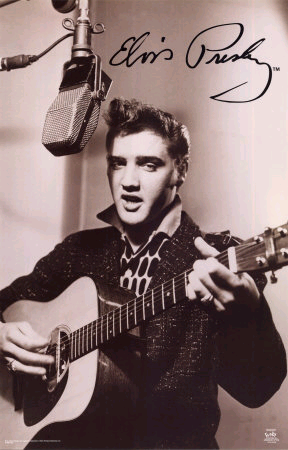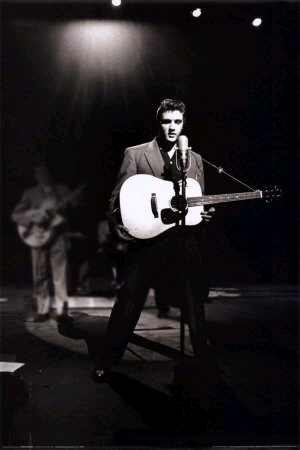| Early life
|
|
Born January 8, 1935, in East Tupelo, Mississippi,
Presley was the son of Gladys and Vernon Presley,
a sewing machine operator and a truck driver.
Presley's twin brother Jesse Garon was stillborn,
and he grew up as an only child. Presley was bullied
at school; classmates threw "things at him—
rotten fruit and stuff—because he was different... quiet
and he stuttered and he was a mama's boy." At age ten,
he made his first public performance in a singing contest
at the Mississippi-Alabama Fair and Dairy Show. Dressed
as a cowboy, the young Presley had to stand on a chair to
reach the microphone and sang Red Foley's "Old Shep." He
won second prize. In 1946, Presley got his first guitar. In
November 1948, the family moved to Memphis, Tennessee.
Presley attended High School, but fellow students apparently
viewed the young singer's performing unfavorably: One recalled
that he was "a sad, shy, not especially attractive boy" whose guitar
playing was not likely to win any prizes. Many of the other children
made fun of him as a 'trashy' kind of boy playing 'trashy' hillbilly
music." Presley occasionally worked evenings to boost the family
income. He began to grow his sideburns and dress in the wild, flashy
clothes of Lansky Brothers on Beale Street. In Memphis, Presley went
to record stores that had jukeboxes and listening booths, playing old
records and new releases for hours. He was an audience member at
the all-night black and white gospel sings" downtown. Presley "was
an untrained musician who played entirely by ear. 'I don't read music,'
he confessed, 'but I know what I like.' ... |

|
 |
 |
 |
 |
| First recordings at Sun Studios
|
|
On July 18, 1953, Presley went to Sun Records'
Memphis Recording Service to record "My Happiness" with "That's When
Your Heartaches Begin", supposedly a present for his mother. On January 4,
1954, he cut a second acetate. Sun Records boss Sam Phillips was on the
lookout for someone who could deliver a blend of black blues and boogie-
woogie music; he thought it would be very popular among white people.
During a recording break, Presley began "acting the fool" first with Arthur
Crudup's "That's All Right (Mama)". Phillips got them all to restart and
began taping. This was the sound he had been looking for. The group
recorded other songs, including Bill Monroe's "Blue Moon of Kentucky".
"That's All Right" was aired on July 8, 1954, by DJ Dewey Phillips. After
its release, both sides of "That's All Right"/"Blue Moon of Kentucky"
began to chart across the South. |
 |
 |
 |
| First public performances
|
|
Moore and Black began playing regularly with Presley. They gave a few
performances in July 1954 to promote the Sun single at the Bon Air,
a rowdy music club where the band was not well-received. On July 30
the trio, billed as The Blue Moon Boys, made their first appearance at
the Overton Park Shell, with Slim Whitman headlining. A nervous Presley's
legs were said to have shaken uncontrollably during this show: his
wide-legged pants emphasized his leg movements, apparently causing
females in the audience to go "crazy". According to one source, "Audiences
had never before heard such music... or seen anyone who performed like Presley
either. The shy, polite, mumbling boy gained self-confidence with every appearance...
People watching the show were astounded and shocked, both by the ferocity of his
performance, and the crowd’s reaction to it... 'His energy was incredible, his instinct
was just amazing... I just didn’t know what to make of it. There was just no reference
point in the culture to compare it.'" Sam Phillips said Presley "put every ounce of emotion ...
into every song, almost as if he was incapable of holding back." Teenager go crazy about him.
But American parents didn't like him because he was too sexy. |
 |
 |
 |
| Controversial King
|
|
When "That's All Right" was played, many listeners were sure Presley must be black,
and most white disc-jockeys wouldn't play his Sun singles. However, black disc-jockeys
didn't want anything to do with a record made by a white man. To some, Presley had
undoubtedly "stolen" or at least "derived his style from the Negro rhythm-and-blues
performers of the late 1940s." By the spring of 1956, Presley was becoming popular
nationwide and teenagers flocked to his concerts. Scotty Moore recalled: "He’d start out,
'You ain’t nothin’ but a Hound Dog,' and they’d just go to pieces. They’d always react the
same way. There’d be a riot every time." Bob Neal wrote: "It was almost frightening, the reaction...
from teenage boys. So many of them, through some sort of jealousy, would practically hate him."
In Lubbock, Texas, a teenage gang fire-bombed Presley's car. Some performers became resentful
that Presley going on stage before them would "kill" their own act; he thus rose quickly to top billing.
At the two concerts he performed at the 1956 Mississippi-Alabama Fair and Dairy Show, one hundred
National Guardsmen were on hand to prevent crowd trouble. To many adults, the singer was "the first
rock symbol of teenage rebellion. ... they did not like him, and condemned him as depraved. Anti-Negro
prejudice doubtless figured in adult antagonism. Regardless of whether parents were aware of the Negro
sexual origins of the phrase 'rock 'n' roll', Presley impressed them as the visual and aural embodiment
of sex."In 1956, a critic for the New York Daily News wrote that popular music "has reached its lowest
depths in the 'grunt and groin' antics of one Elvis Presley" and the Jesuits denounced him in its weekly
magazine, America. Even Frank Sinatra opined: "His kind of music is deplorable, a rancid smelling
aphrodisiac. It fosters almost totally negative and destructive reactions in young people." In 1957,
Presley was alleged to have said: "The only thing Negro people can do for me is to buy my records
and shine my shoes." The singer always denied saying, or ever wanting to say, such a racist remark.
Jet magazine, run by and for African Americans, subsequently investigated the story and found no
basis to the claim. However, the Jet journalist did find plenty of testimony that Presley judged people
"regardless of race, color or creed". His parents moved home in Memphis, but the singer lived there
briefly. With increased concerns over privacy and security, Graceland was bought in 1957, a mansion
with several acres of land. This was Presley's primary residence until his death. Presley's record sales
grew quickly throughout the late 1950s, with hits like "All Shook Up", " Teddy Bear" and "Too Much".
|
 |
 |
 |
 |
 |
 |
 |

















